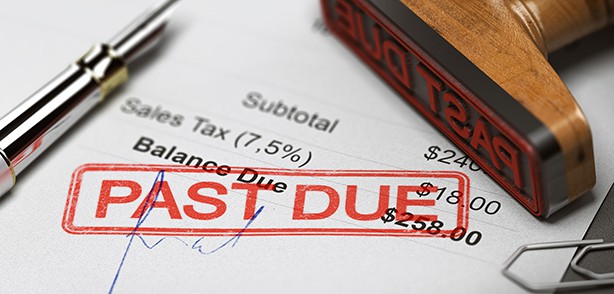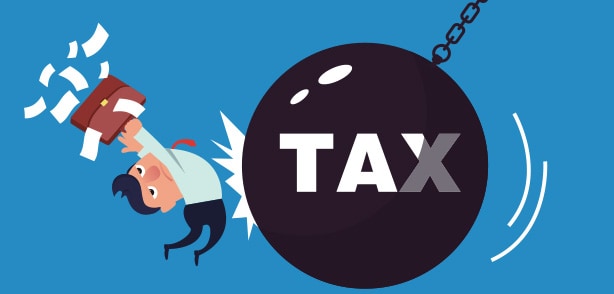When To Chase Accounts Receivable Payments (And When To Give Up)

Far more than a minor annoyance, late payments can significantly harm your business. In addition to the headache of chasing payments, having cash tied up in accounts receivable can hurt your cash flow.
At best, the result of late payments is slower business growth. At worst, they can prevent you from having cash to pay your bills. In this post, to help you address this issue, we'll guide you through the process of chasing accounts receivables.
Accounts Receivable = Unpaid Payments
First, what are accounts receivable?
Accounts receivable are created when a customer purchases a product or service from your business but hasn't paid for it yet. Typically, accounts receivable are supposed to be paid back in 15 to 60 days. Of course, repayment isn't always timely, and that's where the problems start.
However, it'd be a mistake to only pay attention to accounts receivable when they become a problem. The best time to prevent late payments is long before you ever have to deal with one.
Your company's accounts receivable turnover ratio — its ability to issue credit and collect funds — depends on the:
- Conservativeness of your credit policies
- Effectiveness of your collection processes
- Quality of your customers
Ideally, you should have (or plan to have) a system in place built with these factors in mind. However, even with a system in place, your accounts receivable turnover ratio will never be perfect.
When late payments do come, it's important to understand what to do, when to do it, and how to do it. In the following paragraphs, we'll show all that and more with step-by-step guidance on chasing accounts receivable payments.
Breaking Things Down By Phase
As with most aspects of running a business, chasing accounts receivable is all about timing. Depending on how late your accounts receivable payment is will affect how you address the issue.
For example, in some cases, you may want to take legal action against a customer for an unpaid invoice. However, if the invoice is only 30 days late, legal action is a drastic and costly step to take. In fact, escalating things too quickly can cause far more issues than it solves.
In the next few sections, we'll outline what to do based on how late your accounts receivable payment is.
One To 30 Days Past-Due
Day one of payment being late is the best day to begin the accounts receivable chase.
By contacting your client on the first day their payment is late, you send a clear message. That message is: late payments aren't acceptable. Silly as it might sound, this effectively "trains" your client by creating clear expectations.
As Freshbooks points out, it's also smart to tell your client you prefer to be told when a payment is going to be late. That way, they're encouraged to communicate about potential late payments in the future.
After that first contact, you can give them up to a week before it's time to try again. If they don't respond, you can follow up on your email by calling or texting them. Often times, by changing to a method of communication you don't usually use, you can get a quick response.
As annoyed as you might be by this time, it's important to keep your cool. It's feasible that your customer just made a mistake and getting angry could hurt the relationship. If another week goes by, try the alternative method of communication again.
30 To 60 Days Past-Due
If following up multiple times through multiple channels doesn't work, you need to get more aggressive in order to get your customer to pay. Once any invoice reaches 30 days past due, pick up the phone and call them. If they don't pick up, ask that they call you back. Let them know when you'll be available and ask that they leave a message informing you when they'll submit their payment.
In a kind but firm tone, explain what you plan to do should they fail to pay by the date specified. If they do pick up, push for a commitment on the exact date when they can send payment. As with your voicemail, detail the consequences of another late payment.
If you use a web conferencing platform, you may want to record the call as well. Just don't do it without their knowledge. During your call, inform them that you'll send an email recapping what was discussed on the phone. Ask them for a prompt response to the email to confirm they agree to the terms discussed. If you don't reach them by phone, send an email to follow up on your voicemail. Whether you reach them or not, follow up your phone call or voicemail with an email outlining the same information.
60 To 90 Days Past-Due
Although it might be tempting to get angry after 60 days, keep the tone cordial but firm. Follow up via email and by phone at least once every 15 days. Feel free to use other forms of communication too. As you continue to send notices, ramp up the firmness of your requests. While it's important to avoid being rude or threatening, you do want to be crystal clear about the consequences.
Remind them that any goods or services they buy from you will be significantly delayed. If you plan to place them on a credit hold, charge late fees, or send them to collections, tell them. Ensure they know exactly what their late payment is going to cost them. Make sure you explain everything in terms of the impact it will have on their business. For example, if you know they're relying on a certain shipment, tell them it won't arrive unless payment is made.
The important thing is to state facts and avoid threats or other nastiness. Should you decide to go to small claims or civil court, your emails and phone calls may be used as evidence.
90 To 120 Days Past-Due
Once an invoice is over 90 days late, it's time to take action. Generally speaking, you have four choices, which are:
- Cut your losses and give up
- Send the invoice to collections
- Go to small claims court
- File a lawsuit
Of course, the route you take depends on the opportunity cost of continuing to chase the payment. Therefore, if it's going to cost you more in time and expenses to continue chasing a payment, it's not worth it.
Whichever option you choose, let your customer know what you're doing. Give them the details of your plan to send them to collections or go to court. That way, they'll know you're serious.
If you have a collection agency you trust, sending the invoice to collections is preferable to giving up. In collections, you'll get a portion of the invoice, but at least you won't have to deal with chasing payment anymore. However, if you can't find a reputable agency with experience in your industry, you may have to cut your losses.
Your other option is to go to court. Going to small claims court is faster and less expensive than filing a civil lawsuit. Still, it's a time-consuming and emotionally taxing process.
Over 120 Days Past-Due
If giving up or collections aren't viable options, you can file in small claims court or file a civil lawsuit. However, you'll need to carefully weigh the costs and risks of going to court.
Small claims is significantly faster and more affordable than civil court. You don't need a lawyer, and the filing fees — which vary by state — are reasonable. There are, however, limitations in small claims. For example, if you're a sole proprietor in California, you can only sue for up to $10,000. Similarly, as a corporation in California, you're limited to $5000.
If those limits are too restrictive, you'll have to resort to civil court, which can get very expensive, very quickly. Attorney's fees alone will cost $100 to $500 per hour on the low end. Large firms can charge up to $1500 per hour. Exact costs will vary widely — from thousands to hundreds of thousands — depending on the complexity of the case.
If filing a lawsuit is something you're considering, you should speak with a lawyer. An experienced lawyer can give you a rough idea of how much your case would cost. From there, you can make a more informed decision about how to move forward.
Our Final Thoughts
It's important to give your customers the benefit of the doubt on late payments — as frustrating as that may be. Once they've shown that they're actively ignoring your payment deadlines, it's time to get tough. Still, getting tough and being outright rude are two different things — you must know how to toe the line.
Beyond that, the choice to chase or give up on late payments boils down to opportunity cost. Ask yourself: Will chasing a late payment create more value for your business than simply getting back to work? If the answer is no, move on, and subscribe to our email list for more great small business tips.
Since 2008, Fora Financial has distributed $4 billion to 55,000 businesses. Click here or call (877) 419-3568 for more information on how Fora Financial's working capital solutions can help your business thrive.






